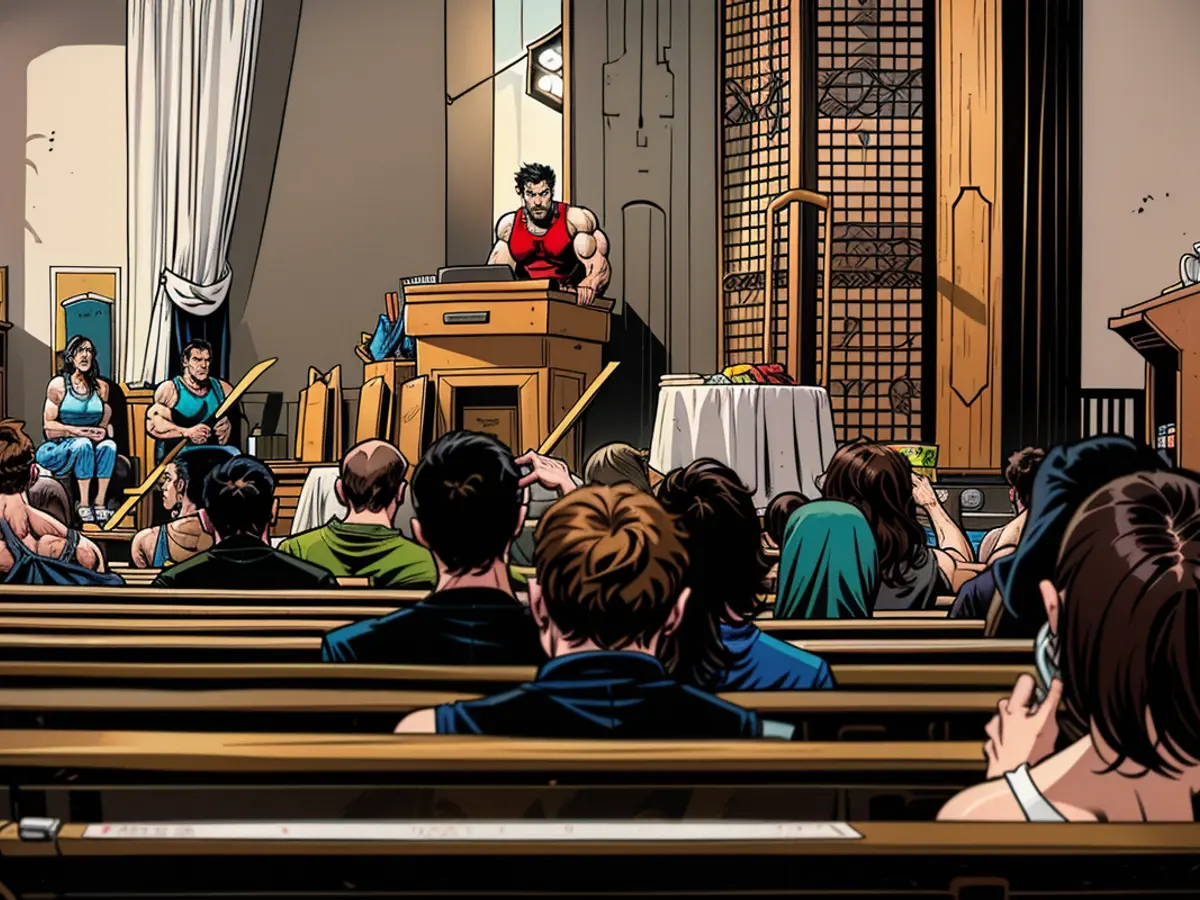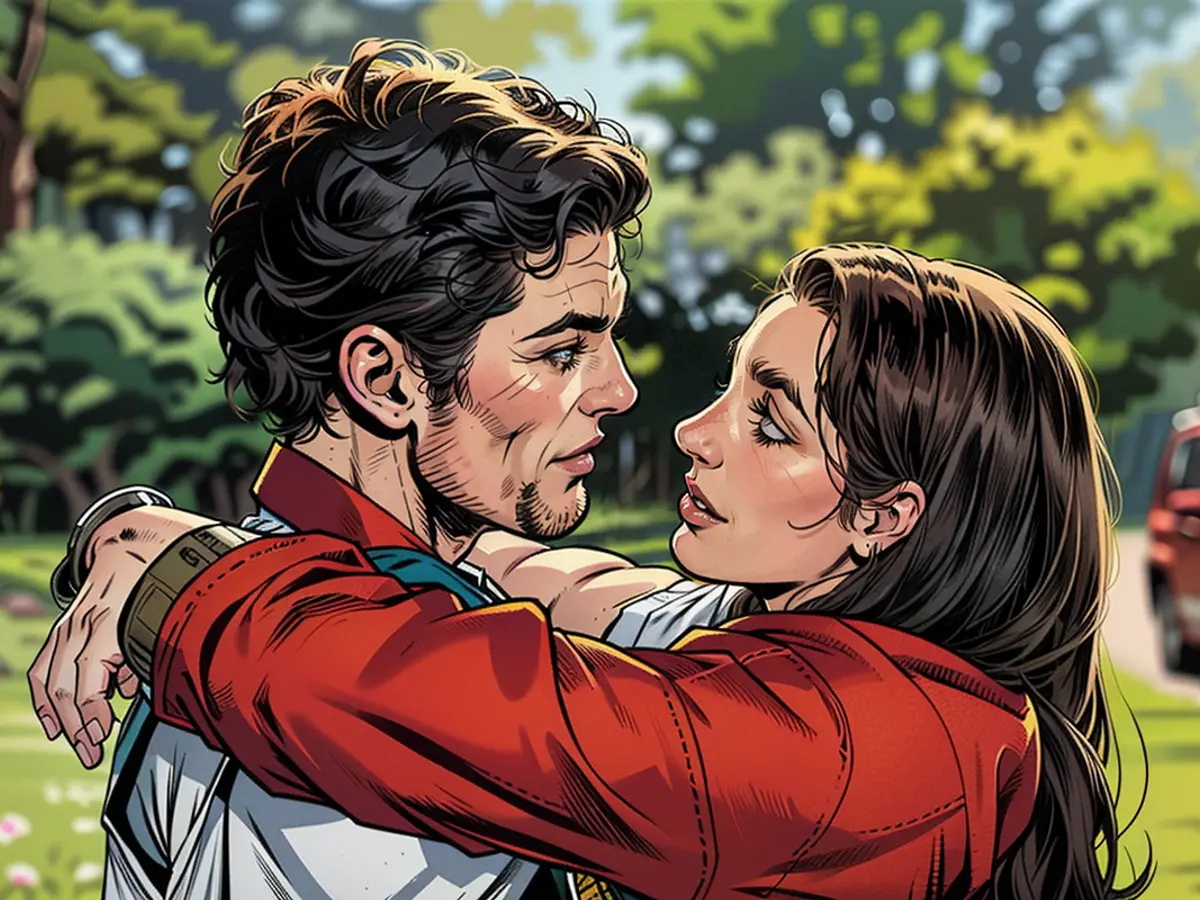These female clerics discuss their perspectives on how their occupation and Jewish traditions are depicted in the series 'Nobody Wants This'.
The chatter surrounding this popular TV show, featuring Adam Brody and Kristen Bell as a new couple dealing with friends, family, and religion, has been rapid and widespread. Viewers have been sharing their opinions on the show's portrayals of Jewish women, conversion, and "shiksas."
If you've somehow missed the currently top-rated program on the streaming platform (which also just announced a second season), Bell plays Joanne, a frank podcaster with no specific religious affiliation who falls for Brody's Noah, a "sexy rabbi" (as the show describes him) who is a prominent figure at his liberal congregation and hails from a somewhat traditional Jewish family. Their undeniable chemistry causes tension in their social circles, which include Joanne's acerbic sister Morgan (Justine Lupe) and Noah's brother Sasha (Timothy Simons), sister-in-law Esther (Jackie Tohn) – who is still close friends with Noah's jilted ex-girlfriend Rebecca – and mother Bina (Tovah Feldshuh).
In the series' inaugural episode, Joanne visits Noah at his temple, where he is swamped by congregants who pester him with questions and requests to set their daughters up with him now that he is no longer with Rebecca. The final scene shows various onlookers at the synagogue – including veteran actor Feldshuh – staring in astonishment as Noah warmly greets Joanne. When Esther asks Feldshuh's Bina who Noah is talking to, she simply replies, "A shiksa" (a less-than-flattering term for a non-Jewish woman, particularly in a relationship with a Jewish man), ending the episode.
This scene, among others, sparked debate about how certain Jewish themes and stereotypes are represented in the show. For Senior Rabbi Amanda Greene of Chicago's reform Sinai Congregation, some of it – even the parts that seemed somewhat extreme – held a familiar ring.
"There's a word 'yenta' out there, right?" Greene said, laughing, during a recent interview with CNN. "Is that the best of who we are? Maybe not. But is that a reality of who some of us are? Maybe."
She also emphasized that it's just a TV show designed for entertainment.
"I would imagine the same is true if you were to interview people from 'My Big Fat Greek Wedding,' right? That's a bit of an over-exaggeration of personalities," Greene said.
Rabbi Adina Allen, a nondenominational rabbi who founded the non-profit Jewish Studio Project, acknowledged that some Jewish female characters in the comedy were depicted as "manipulative, controlling, harsh, and cliquey." However, she observed that they weren't the only ones portrayed in a not-so-flattering light.
"Honestly, the non-Jewish women don't come off looking so good either," Allen said. "The show seems to depict them as vacant, unfocused, self-centered, and shallow. And, at the same time, I liked all of the women. For instance, Esther, the embodiment of the Jewish woman stereotype, is controlling and mean, but she's also loyal and loving."
Rabbi Greene also pointed out that not all the depictions of Jewish women were immediately degrading or caricatured.
"The female rabbi at the camp, I think she's great. I think that's a good depiction. She embraces Joanne. She's an interesting character," Greene said, referring to a hilarious later episode in the season when Noah introduces Joanne to a fellow rabbi, played charmingly by Leslie Grossman.
"Maybe that's what's so great about the show, there's so many interesting characters," Greene added, going on to defend the character of Esther "because she's meant to be hated but also, if your best friend was the ex-fiancé... She's human, too!"
Other moments felt authentic to both real-life rabbis, who found it refreshing.
"When I first started at Sinai, there were lots of people who wanted to set me up," Greene said. "There is some truth in that the congregation wants to know what's going on in the personal life of the rabbi," she added.
Rabbi Allen said the show "nailed how invasive it can feel, especially to be a pulpit rabbi, and especially a young, single pulpit rabbi (from what I know from my friends' experiences)," adding, "in the synagogue scene when all the women are crowding around him to introduce their daughters, that felt real."
Both Allen and Greene viewed Brody's Noah as a relatable character on a spiritual journey, rather than a sanctimonious authority figure or any other stereotypical portrayal of a rabbi.
"He was a person, a person at a bar (or party) who maybe didn't look like the rabbi that Joanne thought a rabbi should look like," Greene said. "Rabbis are people. We're humans and I appreciate that level of depiction of the rabbi."
In a subsequent episode of the series, Noah conducts Shabbat at a bar, an experience that resonates with Greene, having gone through something similar herself when she first moved to Chicago, attempting Shabbat in a bar for young professionals.
Allen admired Noah, finding his lifestyle relatable. "Noah's cool," he commented. "He lives in the world, parties, has a great sense of humor, wears trendy clothes, except for the basketball gear, plays sports, has friends, and a social life. Seeing all of that portrayed on TV made me feel good."
As the first season of "Nobody Wants This" unfolds, Noah and Joanne envision a potential future together. However, as per the show, should Noah ever ascend to head rabbi of his congregation, the presence of a non-Jewish partner could pose issues. This situation prompts consideration of Joanne's conversion, a topic she struggles with at the season's end. Meanwhile, Noah grapples with the difficulty of choosing between advancing in his rabbinical career or deepening his commitment to Joanne, even if she refuses conversion.
Greene harbored mixed feelings about the ending, optimistic that Noah's seemingly straightforward choice might act as a catalyst for the continuation of the story in the subsequent season.
"I adored the show, I loathed the ending," she said. "I believe it to be an oversimplified dilemma. My hope is that season two will progress in a different manner, allowing Noah to avoid having to choose between personal and professional fulfillment."
"Of course, there are instances where one must make such choices, but I prefer the concept of both/and. Consequently, my prediction, and perhaps it's simply wishful thinking, is that in season two, Noah will be able to navigate both aspects of his life... It could just be the plot device for the next season's cliffhanger."
The ongoing discussion about the depiction of Jewish themes and stereotypes in "Nobody Wants This" has extended beyond criticisms of certain characters. Rabbi Adina Allen also noticed that some non-Jewish female characters are portrayed in a less favorable light as well. Furthermore, Rabbi Greene emphasized that the show is a form of entertainment, a platform designed to provide enjoyment and amusement.








